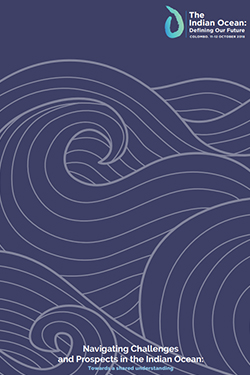Organised by the Office of the Prime Minister, the Ministry of Foreign Affairs, and the Lakshman Kadirgamar Institute of International Relations and Strategic Studies (LKI) in collaborationwith the Global Maritime Crime Programme of the United Nations Office on Drugs and Crime (UNODC), ‘The Indian Ocean: Defining Our Future’ conference was held on 11-12 October 2018, in Colombo, Sri Lanka. Over 300 senior government officials and think tank representatives from over 40 Indian Ocean littoral states and major maritime users participated in the conference.This publication aims to capture the essence of the vibrant discussions that took place at this track 1.5 dialogue. The purpose is to identify overarching concerns and challenges in the Indian Ocean region in the four thematic areas covered i.e. (i) the Indian Ocean Economy, (ii) Oceans as Development Spaces, (iii) Safety and Security at Sea, and (iv) Reinforcing International Law in the Indian Ocean.

Reading Time: 3 min read
For Sri Lanka and many nations, the oceans hold the key to the future. The ocean and its related eco systems are integral to sustaining life on the planet. Covering more than 70% of the Earth’s surface, oceans act as a moderator of global climate conditions and climate regulators, producing a third of the oxygen that people breathe. As approximately 80% of the volume of global goods trade and much of its energy trade is seaborne, the oceans are a critical transport artery. Oceans are both a source of energy and a source of food. Oceans, therefore, are a shared responsibility and the common heritage of humankind.
The world has been witnessing a global economic power shift with the rise of Asia. The Indian Ocean, which has emerged as one of the world’s busiest and most critical trade corridors, rapidly surpassing the Pacific and Atlantic Oceans, is pivotal to this transition. It carries two-thirds of global oil shipments and a third of bulk cargo and hosts the most critical Sea Lanes of Communication (SLOCs), directly impacting the development of global trade and economic activity. The Indian Ocean basin has become one of the fastest growing commercial hubs for the exchange of goods, services and people.
The Indian Ocean is of interest not only to the littoral states but also for major maritime users. Managing expectations and ensuring order in an era of heightened change marked by rapidly changing economic conditions, will be central to achieving security and prosperity for the region. It is the collective responsibility of the countries in this region and beyond to ensure that the Indian Ocean remains, and is developed as an Ocean of Peace that:
is thriving in economic activity;
is a model in environmental protection;
and works on the basis of the international rules-based order.
Sri Lanka considers strengthening of security, safety and sustainability of activities as a prerequisite to guaranteeing the freedom of navigation and overflight, unimpeded commerce and the freedom of digital connectivity in the Indian Ocean. ‘The Indian Ocean: Defining Our Future’ conference was conceived with a view of creating a platform that could bring littoral states and major maritime users together to address issues of mutual concern.
Organised by the Office of the Prime Minister, the Ministry of Foreign Affairs, and the Lakshman Kadirgamar Institute of International Relations and Strategic Studies (LKI) in collaboration with the Global Maritime Crime Programme of the United Nations Office on Drugs and Crime (UNODC), this track 1.5 dialogue was held on 11-12 October 2018, in Colombo, Sri Lanka. Over 300 senior government officials and think tank representatives from over 40 Indian Ocean littoral states and major maritime users participated in the conference.
This publication aims to capture the essence of the vibrant discussions that took place at this track 1.5 dialogue. The purpose is to identify overarching concerns and challenges in the Indian Ocean region in the four thematic areas covered i.e. (i) the Indian Ocean Economy, (ii) Oceans as Development Spaces, (iii) Safety and Security at Sea, and (iv) Reinforcing International Law in the Indian Ocean.
The Indian Ocean region is set to define the destiny of the planet in the 21st century. It is one of the fastest growing regions in the world and is expected to reach middle-income status by 2025. This offers significant economic opportunities for the ocean’s surrounding states and maritime users. But expansion also carries risks from rising competition in the region among big powers, environmental degradation and maritime crime.
For smaller states an essential element to maximising opportunities and minimising risks is to actively support the international rules-based order. This applies particularly to Sri Lanka and its long-held ambition to become a hub of the Indian Ocean.
The international rules-based order is not an abstract idea; there are established rules and principles (such as freedom of navigation), which operate on a common understanding of challenges and solutions in the region and around the world. In hosting this dialogue, Sri Lanka is contributing to the maintenance of that common understanding, and thereby ensuring a stable rules-based order in the Indian Ocean in which we can all thrive and grow together.